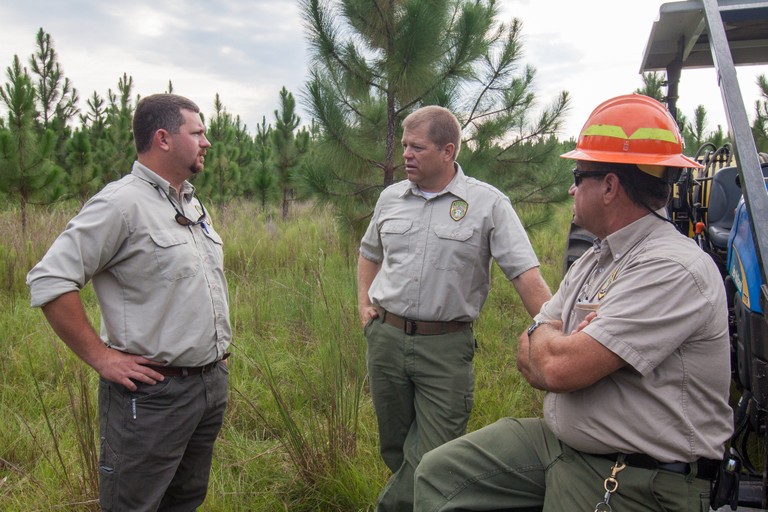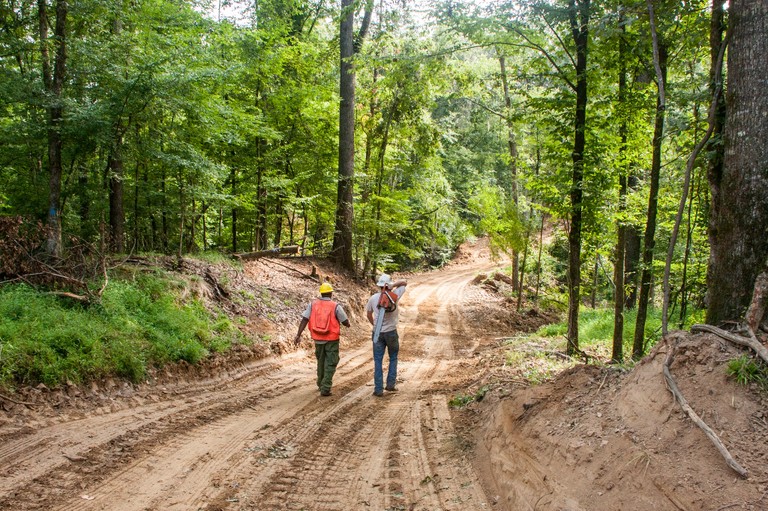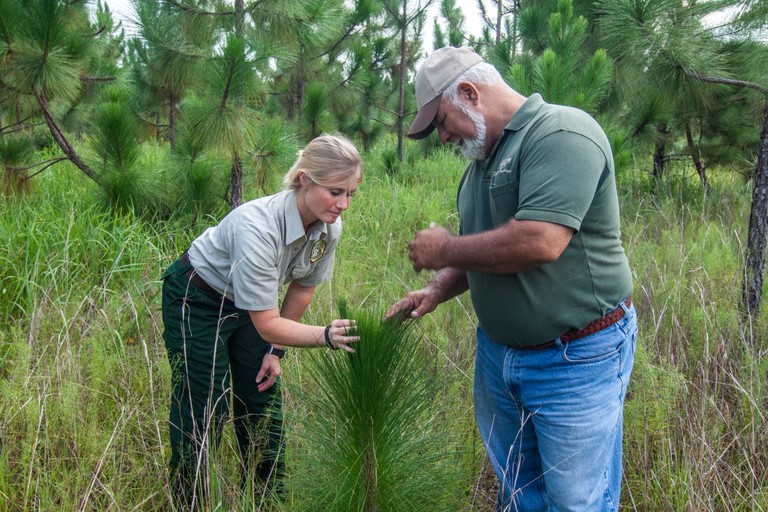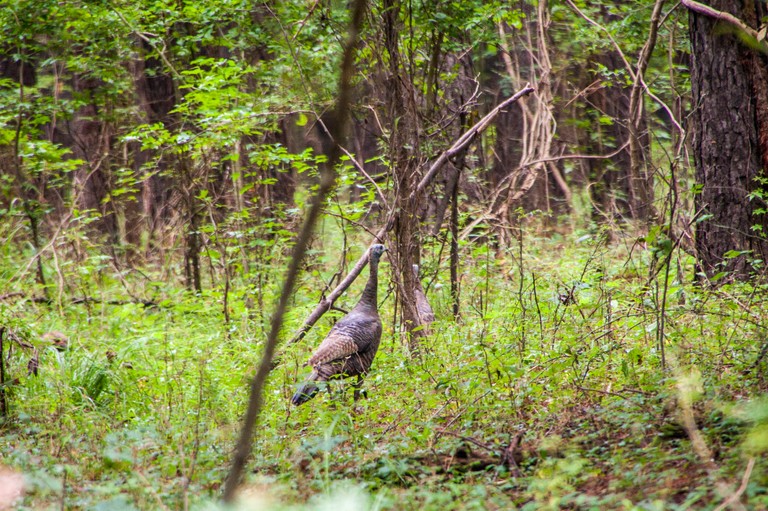Updates & Blog
Meet the Mississippi State Forester, Russell Bozeman

Russell Bozeman began his career with the Mississippi Forestry Commission (MFC) in 2010 as Director of Forest Protection and Forest Information.
In 2015, Bozeman was promoted to the position of Assistant State Forester. Bozeman supervised the agency’s wildfire response efforts, public outreach and education division, and urban forestry division. Additionally, he served as legislative and external partner liaison, as well as engaged in strategic planning activities, budget oversight, and new program development to ensure healthy and productive forests for the people of Mississippi.
In December 2018, the MFC’s Board of Commissioners named Bozeman the Mississippi State Forester. The State Forester oversees the state agency’s leadership team in forest protection, forest management, wildland fire management, forest inventory, and forest information distribution.
Before entering public service with MFC, Bozeman worked in the Habitat Management Division for BASF Corporation for two years before moving to HAGLOF, Inc. for nine years, serving lastly as their North American Sales Manager.
Bozeman holds a Bachelor of Science degree in Forestry with a concentration in Forest Management from Mississippi State University. He is a registered forester in Mississippi, a member of the Southern Group of State Foresters, the National Association of State Foresters, the Society of American Foresters, the Mississippi Forestry Association and the Hinds County Forestry Association.
Bozeman was born, raised and currently resides in Raymond, Mississippi with his wife and two daughters.
What is your agency’s mission statement?
The mission of the MFC is to provide active leadership in forest protection, forest management, forest inventory and effective forest information distribution necessary for Mississippi’s sustainable forest-based economy.
Why did you become a forester?
I grew up in a rural farming family and spent most of my time outdoors. When it was time to start thinking about a career, I knew I wanted something outdoor-related. In high school, I noticed that many small farmers in our area were no longer running cattle or row crop operations and were planting trees. We planted some trees too. I had a dibble bar in my hand at an early age. When it was time for college, forestry seemed like a good choice.
In your opinion, what is the biggest issue impacting forest landowners in your state and across the southern region?
Since most of our southern forests are owned by non-industrial private forest landowners, I believe access to healthy markets is critical to keeping our forests intact. Landowners appreciate a return on their investment just like anyone else does. That return helps them continue to keep their forests and manage them. Healthy markets create healthy forests, and healthy forests create healthy lives.

What is your favorite thing about the forests in your state?
We are fortunate that most of our state’s land mass is covered in diverse forest habitats that provide countless benefits. My favorite thing about these forests is their diversity. Within a few hours of any location in our state, you can be in an entirely different forested ecosystem with a completely different set of benefits and management needs.
How is forestry important to the economy of your state?
The forestry industry in Mississippi is a vital part of our state’s economy. It is a $13 billion industry for the state, providing almost 70,000 jobs, a wealth of forest products, improved water quality, green spaces, wildlife habitat, recreational experiences and economic benefits. Additionally, timber is always one of the top three commodities in the state of Mississippi.
What is your favorite thing to do while in the forest?
I am an avid hunter and fisherman. Any day in the woods or on the water is a good day. I also enjoy camping on our property with the kids. They still love hauling a tent to the back forty and camping for the night.
What are the top five goals for your agency over the next 5-10 years?
- Improve forest markets and sustainability for the state as a whole.
- Continue education and outreach on forestry to the residents of Mississippi.
- Retain and recruit the best employees for the agency.
- Maintain relationships with partners on all levels to benefit our forests and forest landowners in the state.
- Continue to work through issues in the Mississippi Forest Action Plan.
Why are the adoption of forestry Best Management Practices important to your state?
The proper use of BMPs result in the betterment and protection of our forestland so that many generations can enjoy our natural resources. We are fortunate to have a high voluntary implementation rate in Mississippi, proving that our industry and our landowners care for the land – keeping it healthy and productive into the future.
How is your agency working with communities and municipalities to encourage forestland retention?
MFC works with private landowners, communities and municipalities to educate them on the benefits of forestland. Through several different programs, MFC helps promote the incorporation of more forestland into the state on all levels.

How is prescribed fire important to the landscape of your state?
Prescribed fire, also known as a controlled burn, refers to the controlled application of fire by a team of fire experts under specified weather conditions that help restore health to fire-adapted environments. This process reintroduces the beneficial effects of fire into an ecosystem, producing the kinds of vegetation and landscapes which improves habitat. Additionally, prescribed fire reduces the risk of catastrophic wildfire caused by excessive fuel buildup.
What is your favorite tree species?
This is a tough question to answer. There are multiple native trees in Mississippi that warrant favortism for there own unique reasons. But if you’re going to make me pick one, I’d have to pick our state tree, the southern magnolia. The southern magnolia is a gorgeous tree found throughout state. It is a beautiful evergreen with very fragrant, creamy white flowers and the sight of it conjures images of southern culture.

How does your agency work with local and municipal partners to conserve your state’s forests?
Through our Urban and Community Forestry programs, we have worked with local and municipal partners for years to help educate them on the importance of urban trees. We also assit them with the management of their resource, using practices like hazard tree assessments, storm recovery recommendations and street tree inventories.
How do partnerships play a role in wildfire response in your state?
It is impossible to do our job without working with our local, state and federal partners. These relationships are vital wildfire mitigation and suppression in Mississippi. One of our important partners are volunteer fire departments (VFDs), who are often the first ones to the scene of the wildfire. Because of this, we make sure VFDs have access to wildland firefighting equipment as needed through the USDA Forest Service Firefighter Property Program, when eligible.
What is your favorite native Mississippi animal?
If I had to pick one, it would have to be the eastern wild turkey. The wild turkey has a unique and storied history in this country, and we have a healthy population here in Mississippi today. They are my favorite game species to chase.

What are some of the biggest forest health challenges in your state and how is your agency working to address them?
Monitoring and managing our forest’s health is a big part of what we do everyday here at MFC. Some of our biggest forest health threats include the Southern Pine Beetle and non-native invasive species like cogongrass or Chinese tallow tree. Both of these threats are a real risk to the forest and they are very expensive for landowners to manage.
Additionally, the availability of viable markets can be a forest health threat. Without markets for landowners to access, forests can get overstocked and become vulnerable to insects, disease and storms. As mentioned before, a private landowner is more likely to invest in their property to manage these threats if they can receive a return on their investment.
What is your agency doing to support the use of trees and forest products as a carbon solution?
I believe trees are the answer to most any question. We know trees are renewable and capture carbon. We also know that the captured carbon in wood products will remain captured for the life of that product. It makes sense to me that trees and forests are part of the conversation around carbon solutions.

Smokey Bear or Woodsy Owl?
Smokey! Smokey Bear is one of the most recognizable figures in forestry, if not the entire country. We are fortunate to have him as a messenger and appreciate the partnership with the USDA Forest Service in allowing us to use his image here in Mississippi to educate the public on the dangers of wildfire. I have also been in the Smokey suit myself many times during my career and have seen firsthand people’s response to him and his message.
What is one thing you want people to know about your agency?
First and foremost, I want people to know we are a service agency. We are here to help in all phases, segments and aspects of forestry in our state. We want people to reach out to us any time and let us assist you. Our forests benefit all people in Mississippi and we are proud of the services we provide to keep these forests healthy and productive.

What is the best thing about being the Mississippi State Forester?
The ability to serve the public and an industry that is so important to our state. I am also blessed to work with a talented team and great partners who value the services we provide to our state and our landowners just as much as I do. And that helps make this a great place to work.